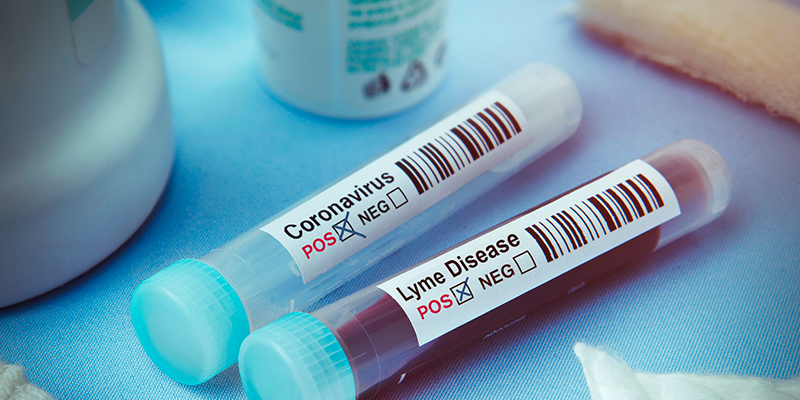
When the coronavirus pandemic hit, Justin Bieber—who revealed in his 2020 docuseries that he has been seeing neuropsychiatrist and brain imaging specialist Dr. Daniel Amen for years—and his wife Hailey Baldwin put themselves into self-quarantine in their home in Canada.
That may have been a smart move for the superstar, who also recently announced that he’s been diagnosed with Lyme disease.
“Having Lyme disease may increase vulnerability to the coronavirus and could raise the risk of serious consequences if you’re infected with COVID-19,” says Mark Filidei, D.O., the director of integrative and functional medicine at Amen Clinics in Costa Mesa, California.
That’s bad news for the estimated 300,000 people who are diagnosed each year with Lyme disease, according to the CDC. In many areas of the country, it’s tick season, and according to a report from Boston 25 News, one doctor said they’re already getting more calls about tick bites than usual.
The threat of developing Lyme disease while sheltering at home can be especially frightening during the pandemic because it causes many of the physiological symptoms as those seen in COVID-19—fevers, sore throat, headache, and body aches. Nobody wants that now.
What is Lyme Disease?
Lyme disease (Borrelia burgdorferi) is a bacterial infection caused by the bite of an infected black-legged tick, also known as a deer tick. It is associated with a telltale bulls-eye rash that develops within a few days of a tick bite. “But a considerable percentage of people never get a rash, and many people don’t even realize they have been bitten by a tick,” says Filidei.
This is one reason why Lyme disease has been vastly under-diagnosed in the U.S. Other reasons include inadequate testing methods and a general lack of acknowledgment by the medical community that it is a real illness.
If the infection is caught early, antibiotics can often successfully treat it and avoid any lasting problems. However, when Lyme disease remains undetected, it allows the infection to fester, wreaks havoc on the immune system, causes a host of inflammatory responses, reduces blood flow, and impairs healthy brain function.
Immune system disruption is the last thing anyone needs now with COVID-19 spreading around the globe, infecting nearly 2 million people and causing over 100,000 deaths.
A 2018 study in the Journal of Immunology found that Lyme disease disrupts the immune system. The findings show that the disease activates T cells, soldiers of the immune system that are intended to target foreign invaders in the body. In the case of Lyme disease, however, the activated T cells interact with the bacteria from the tick bite, producing a cascade of inflammation.
When Lyme Disease Becomes Chronic
In some people, treatment with antibiotics doesn’t alleviate symptoms, and 5%-30% of people develop chronic symptoms, a condition known as post-treatment Lyme disease syndrome (PTLDS). A 2019 study in BMC Public Healthestimated that nearly 2 million people are living with chronic symptoms of Lyme disease.
In a 2017 study with 61 PTLDS patients and 26 healthy controls in Frontiers in Medicine, 50% of the chronic Lyme disease patients reported severe fatigue, 31% had severe sleep issues, 28% suffered from severe pain, 23% struggled with severe cognitive issues. By comparison, the healthy controls reported no “severe” symptoms.
“People with chronic Lyme disease struggle with a host of neuropsychological symptoms, including memory problems, trouble with focus, impulsivity, poor problem-solving, slower mental processing speed, addictive behaviors, changes in personality, suicidal thoughts, and more,” according to Filidei.
Traditionally, the medical community has dismissed the fact that infections can be associated with these types of symptoms, but that is changing. A 2016 editorial in the Journal of Alzheimer’s Disease written by a worldwide group of 33 scientists suggested the medical community has been neglecting to look at infectious diseases as a root cause of many memory problems, including Alzheimer’s disease and other dementias.
Because many traditional healthcare providers still don’t acknowledge that psychiatric symptoms may be caused by Lyme disease, symptoms are often misdiagnosed. People with undetected Lyme disease may be diagnosed with depression, bipolar disorder, anxiety, schizophrenia, dementia, or other mental health conditions. Filidei says that “unless the underlying Lyme disease is addressed, traditional treatments for these issues may not be effective, or they may actually make symptoms worse.”
Getting an Accurate Diagnosis During a Pandemic
If you suspect you may have this tick-borne disease, it’s more critical than ever to seek help in light of the coronavirus pandemic. But Lyme disease can be challenging to diagnose. Seeing an integrative or functional medicine physician is a good place to start.
In addition, brain imaging can help. On brain SPECT scans, infections in the brain tend to show an overall pattern of significantly low blood flow and may appear toxic. When these abnormal brain patterns are visible, it calls for additional testing to determine the type of infection that may be causing cerebral blood flow issues. Lab tests for Lyme disease include the Western Blot (WB), Immunoblot, and C6 Lyme ELISA, and although they offer critical data, Filidei cautions that they are only part of a comprehensive diagnostic process. Diving into a person’s clinical history helps complete the picture.
With a precise diagnosis, you are better able to address underlying infections and related symptoms. And that makes you better able to fend off other infections and to cope with the mental strain associated with quarantine.
At Amen Clinics, our integrative and functional medicine physicians have seen hundreds of patients with resistant complex psychiatric symptoms or cognitive problems who tested positive for Lyme disease. When the underlying infection is addressed as part of a comprehensive treatment plan, symptoms improve significantly.
Just because you’re sheltering at home doesn’t mean you have to wait for the pandemic to be over before seeking help. In fact, during these uncertain times, your mental well-being is more important than ever, and waiting to get treatment is likely to make your symptoms worsen over time. At Amen Clinics, we’re here for you. We offer mental telehealth, remote clinical evaluations, and video therapy for adults, children, and couples, as well as in-clinic brain scanning to help our patients. Find out more by speaking to a specialist today at 888-288-9834. If all our specialists are busy helping others, you can also schedule a time to talk.





Thank you so much for that information.
Comment by Roberta Allen — May 1, 2020 @ 5:40 AM
Excellent information…Having and working on a farm increases our opportunity to come into contact deer ticks.
During the summer it is increasingly easy to relax and walk in the woods in shorts and short sleeve shirts, thus increasing exposure…While it is uncomfortable at times, it’s best to wear summer clothing with long sleeves and pants for protection…We also spray prior to walking in deep woods…It also is important to be vigilant in checking pets that accompany you in the outdoors…
Comment by Dr. Henry Sinopoli — May 1, 2020 @ 5:50 AM
I have suffered from Lyme disease for 13 years. Took anabiotic’s and three months of IV therapy which cleared lots of toxins and got me out of two years in bed. So I guess I am PTLDS. A documentary called under our skin came out right at the time I was diagnosed. The woman who created that documentary has written a book called: bitten. She documents well an accusation that the lime chick was injected with chemicals – An East Coast military base issued these orders to a Swiss scientist who has been working on antibiotics for Rocky Mountain spotted fever and lime. He actually named LYME. This woman is a science journalist at Stanford and I found her book compelling. I understand Johns Hopkins is doing research online but still has no protocol for it. If this is like agent orange, which was sent to Vietnam by the same military base, how does the binnacle world get on top of treating our own inflicted chemical warfare efforts. I have friends who have died from lung disease after being in Vietnam as Marines. Isn’t there a great possibility that this is for COVID-19 will end up in its origins from China? It’s hard to know who to go to these days I’ve had for Lyme specialist in New Jersey Pennsylvania and Maryland but I’m now living in Alabama. With past skepticism as to lives existence, the medical world has not allowed any insurance for doctors appointments, testing or treatments and medications. It’s been a very expensive disease to treat
Comment by Dianne E. Balch — May 1, 2020 @ 5:52 AM
Do you take MediCare?
Comment by Margaret — May 2, 2020 @ 3:55 AM
I had undiagnosed Lyme for 20 to 30 years and finally had a Lyme specialty Lab Western Blot test which showed I had it for a long time. For the past 6 years I have studied the disease and watched endless presenters at Lyme conventions. I have learned a lot about Lyme and it’s coinfections and how it can cause havoc on every part of the body. Now we have Covid-19 and doctors are finding that this virus to is effecting the heart, blood, lungs, brain, kidneys, etc. I wonder if patients with these complications may also have tick born illness as well.
Comment by Catherine Gauthier-Nelson — May 2, 2020 @ 11:53 AM
I am know as The Tick Terminator and have been preaching this same Idea in this article for several months now. I am all about prevention and encourage people to treat their clothes with permethrin before they go out. Amen Clinic did a very good job on this article, very well written !
Comment by Brian Anderson — May 4, 2020 @ 8:59 AM
Which reminds me, I’ve been meaning to create a special cat-proof (with hibernating space) habitat in my yard for the Western Fence Lizard. They’re immune to Lyme, and reduce its impact in California). Plus, they eat lots of flies! Very entertaining to watch them in the garden.
Comment by Sandra — May 5, 2020 @ 12:00 PM